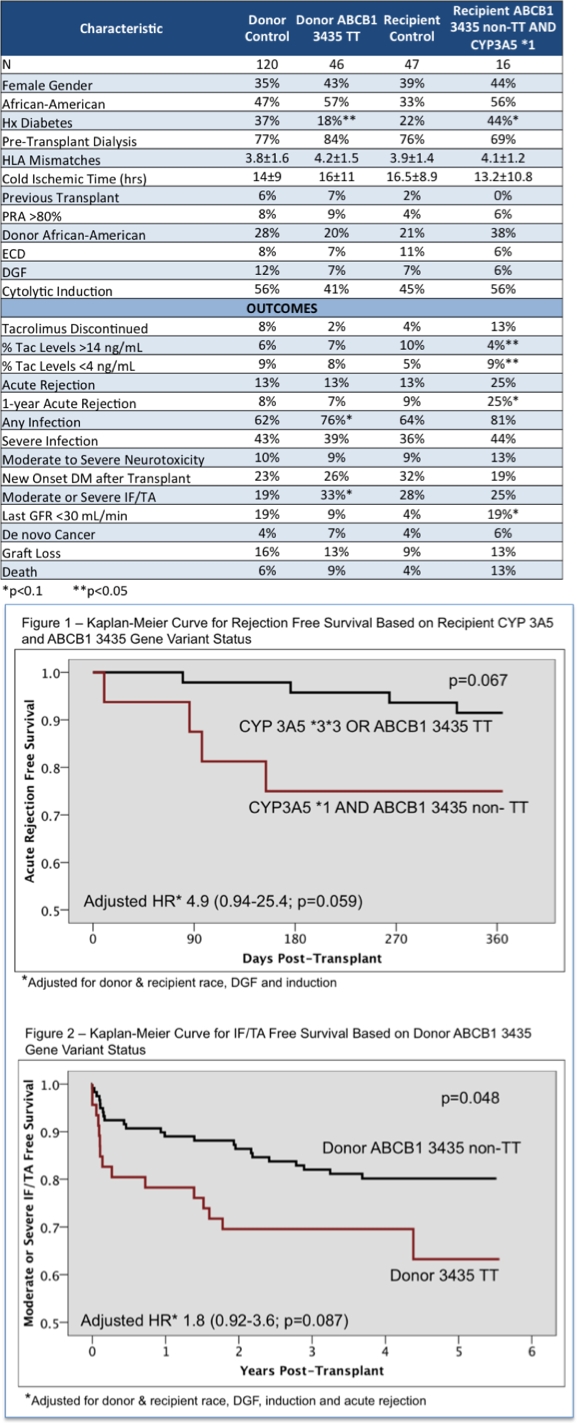The Association Between Donor & Recipient Gene Variants and Tacrolimus Safety & Efficacy in a Diverse Cohort of Kidney Transplant Recipients
Medical University of South Carolina, Charleston, SC.
Meeting: 2015 American Transplant Congress
Abstract number: B255
Keywords: Fibrosis, Genomic markers, Kidney transplantation, Rejection
Session Information
Session Name: Poster Session B: Translational Genetics and Proteomics in Transplantation
Session Type: Poster Session
Date: Sunday, May 3, 2015
Session Time: 5:30pm-6:30pm
 Presentation Time: 5:30pm-6:30pm
Presentation Time: 5:30pm-6:30pm
Location: Exhibit Hall E
Previous studies have associated donor P-glycoprotein (PGP) gene variants (ABCB1) with risk of developing CNI-toxicity, while also establishing recipient CYP3A5*1 and ABCB1 gene variants are correlated with CNI exposure. However, there are limited studies analyzing these variants in a racially diverse cohort of contemporary kidney transplant (KTX) recipients utilizing FK/MMF/Pred regimens.
Methods: Secondary analysis of a RCT induction trial (rATG vs. IL-2RA), with long-term follow up and gene variant analyses. Gene variants for PGP and CYP3A4/5 were analyzed in both the donor and recipient using the Sequenom MassARRAY iPLEX platform. These results focus on the variants showing the strongest association with clinical outcomes, including ABCB1 3435 TT in the donor (low PGP expression) and CYP3A5*1/ABCB1 3435 non-TT in the recipient (high FK clearance). Cox models were used for mutlivariable modeling.
Results: Of the 200 patients in the RCT, gene variant analysis was available in 166 donors and 63 recipients. In the recipient gene analysis, those with the high FK clearance variant had similar baseline characteristics, but were more likely to experience low tacrolimus levels (<4ng/mL) and less likely to have high tacrolimus levels (>14 ng/mL, p<0.05, bottom right Table 1). This cohort also had a higher rate of 1-year acute rejection (25% vs. 9%, p=0.059, Figure 1). Within the donor gene analysis, 46 (28%) had the ABCB1 3435 TT allele (low PGP expression); other than a history of DM, baseline characteristics were similar between groups (top left of Table 1). Recipients of donor organs with the ABCB1 3435 TT allele were more likely to develop moderate or severe IF/TA (Figure 2, p=0.087).
Conclusions: These results suggest that KTX recipients with gene variants for high FK clearance are at higher risk for acute rejection, potentially due to low FK exposure. Gene variants for low PGP expression in the donor organ may be a potential risk factor for graft fibrosis. Donor and recipient genotyping may allow clinicians to individualize FK regimens in KTX recipients, optimizing outcomes.

To cite this abstract in AMA style:
Taber D, Srinivas T, Pilch N, Gebregziabher M, Egede L, Baliga P, Chavin K. The Association Between Donor & Recipient Gene Variants and Tacrolimus Safety & Efficacy in a Diverse Cohort of Kidney Transplant Recipients [abstract]. Am J Transplant. 2015; 15 (suppl 3). https://atcmeetingabstracts.com/abstract/the-association-between-donor-recipient-gene-variants-and-tacrolimus-safety-efficacy-in-a-diverse-cohort-of-kidney-transplant-recipients/. Accessed February 16, 2026.« Back to 2015 American Transplant Congress
